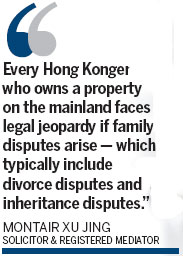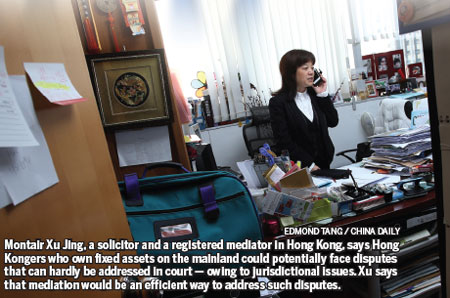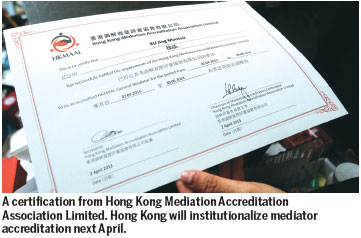The boundaries of family loyalty
Updated: 2013-11-29 06:54
By Andrea Deng(HK Edition)
|
|||||||||
As ties between Hong Kong and the mainland draw closer and tighter, the number of cross-border disputes over property is increasing in steps. Many issues are outside the reach of the courts... leaving mediation as the only solution. Andrea Deng writes.
K W Lam of Hong Kong never would have believed a property on the mainland, inherited by his father and three aunts, could turn in to a nightmare that would drag on for more than 10 years. The skein of complications seemed endless. The case came to a stalemate - and for nearly a decade, remained unresolved
The problem came down to one issue: the property was on the mainland. Rulings by courts in Hong Kong have no standing across the border.
The dispute that ruptured the Lam family is typical, says Montair Xu Jing, a solicitor, who moved to Hong Kong from Shanghai about two decades ago. She is well acquainted with the laws of both Hong Kong and the mainland, and has dealt with scores of family disputes involving cross-border families.
Cases involving fixed assets often cannot be resolved through the courts because of jurisdictional issues. Over and above that, there are differences in the laws. Given their complexity, such cases, even if they could be addressed through litigation at all, could drag on for years in court.
Xu is also a registered mediator in Hong Kong who has actively campaigned for an expansion of mediation services to solve cases entangling cross-border families.
Xu said that mediation is much more efficient - sometimes a dispute may be resolved in four hours, or if the dispute is complex, the different facets may be mediated separately with the process eventually taking up to a week.
"The goal of mediation is to find a bottom line with which all sides are satisfied," Xu concluded. "Mediators are professional middlemen who are able to get all sides letting loose their grievances, communicating with the disputants, determining what they ultimately need and trying to connect the needs of all parties until they reach common ground."
"Many of the family disputes boil down to pride or accumulated grievances. In mediation, the first thing we do is get all sides to sit down with each given equal time to air their grievances," said Xu.
One reason mediation can be very efficient is that it is goal driven. While all parties sit down together to press their own self-interest, it's only natural that the clients enter into fierce verbal confrontation at one state. The mediators' role through this will be reminding all sides, constantly, that their mission is not to unleash their hard feelings, but to resolve the dispute by reaching an agreement acceptable to all sides.
"We say to our clients, 'if we could reach an agreement today, the trauma will end.' And how do we find a common ground when one side is demanding 800 grands while the other is only willing to pay 200? We'd say, why are you demanding so much anyway? The other side is saying that your evidence is insufficient. Do you want to have to go to court again? It's gonna cost you much more and you don't really have a shot at winning," Xu explained.
Cross-border family dispute
In 2002, am's aunt died as the result of a motor vehicle crash. The deceased aunt owned property in Guangzhou. She was unmarried. Her brother - (Lam's dad) - and her three surviving sisters became the heirs to her estate.
Were the property in Hong Kong, the disposition would have been simple: achieve a consensus on division of assets; if a consensus couldn't be reached, the family could petition the court to adjudicate the matter. But having the property on the mainland put an entirely different complexion on things.
The surviving siblings did come to a consensus to sell the house. The first step was to transfer the deed from the deceased aunt to one of her heirs. Right away things started to get complicated.
Lam's dad was chosen as executor of the inheritance by consensus. His lawyer in Hong Kong advised that to simplify matters the three aunts ought to vacate their rights to the property; Lam's dad would sell it and divide the proceeds equally four ways. The sisters, acting on the advice of their lawyers, refused - unless their brother paid a "good faith" sum of money in advance. Lam's father declined.
Lam was particularly put out, since he got stuck with paying the management fees on the property and nearly all the bills, for the duration.
Finally, Lam decided to act on behalf of his dad and sue his three aunts. Acting on the advice of a friend in the property management business on the mainland, Lam engaged a mainland solicitor and filed an application seeking a court order that the property be sold at a compulsory auction. Lam's dad, by then 87, was getting so old that unless the matter were resolved in a timely manner, Lam feared he might die before the matter was settled.
The oldest aunt died. Her son and daughter inherited her estate. The youngest aunt agreed that the court should order that the property be auctioned. Then, just last year, the disputing parties were advised to take the case to mediation.
"We all knew it would be a waste of time and money to sue one another. And we all knew all we wanted was to sell the house and divide the money," Lam told China Daily.
The surviving heirs filed application to the court in Guangzhou and agreed under the court's guidance to sell the property within a specified time, and thereafter to divide the money.
With the court's decree clearly defining the rights of the parties, the heirs agreed and the case moved toward its long-delayed conclusion.
Many disputes in which Hong Kong residents become entangled in mainland properties are incapable of being resolved through the courts. Frequently, properties are left in limbo after the proprietor dies and the name on the property title is left unchanged, no heirs are named, or the heirs can't agree on the division of assets.These are considered "dead cases".
While marriages between mainlanders and Hong Kong people are common and many Hong Kong permanent residents work across the border, few are aware of the potential legal jeopardy if they buy property on the other side of the border.
"Cross-border connections will only get closer and closer and thus there will only be more and more disputes and more people - be it mainlanders or Hong Kongers - in need of help to solve the disputes," said Xu.
Extramarital affairs commonest cause
Xu told China Daily that the most common cases to embroil Hong Kong families in cross-border legal issues arise when a married man from Hong Kong, engages in an extra-marital relationship with a woman from the mainland and has purchased property across the border.
"Usually the wife in Hong Kong discovers her husband owns a property on the mainland, then the extramarital affair is exposed, and the Hong Kong wife will demand a share of the mainland property," she said.
"There are so many such cases."

The wife files for divorce in Hong Kong, a division of assets must be decided, including fixed assets. The court may rule that the wife is entitled to a share of the property on the mainland, but the order would be unenforceable on the mainland. The aggrieved wife in Hong Kong would usually end up getting nothing, Xu said.
"(These troubles) are not just confined to cases involving extramarital affairs, however. Every Hong Konger who owns a property on the mainland faces legal jeopardy if family disputes arise - which typically include divorce disputes and inheritance disputes," said Xu.
And often, as such disputes are hard to address and are left unresolved, the longer they last, the more complicated they can get. People with legal interests in the property may die, new family members may enter the case, said Xu.
It is not uncommon for cases like these to take between three to five years to go through in the courts. It is also rather costly. In Hong Kong, solicitors charge by the hour; on the mainland, court expenses are pegged to the market price of the property - legal fees could amount to a third of the value of a premium property. The higher the property value, the higher the legal fees, Xu said.
"It (mediation) is about the art of speaking," Xu concluded."A difference between how a lawyer and a mediator works is that a lawyer will fight for the greatest possible benefit for his client, while a mediator would help to find the most satisfactory bottom line that is acceptable for his client and the other disputants," said Xu.
She added that although mediation cannot solve all the family disputes, 70 percent can be solved through mediation without going to the court, based on her own experience.
Hong Kong institutionalized mediation as part of legal proceedings in 2010. Disputants are encouraged to seek mediation once they have petitioned the court. If either party declines mediation, he could be assessed legal costs if, in the end, the matter is judged against him.
Hong Kong will also institutionalize mediator accreditation next April. The Hong Kong Mediation Accreditation Association Limited (HKMAAL) was only set up in April this year, co-founded by the Hong Kong Bar Association, the Law Society of Hong Kong, Hong Kong Mediation Centre and Hong Kong International Arbitration Centre.
The more cases resolved through mediation, the shorter will be the backlog on the court lists, Xu said.
Some mediation services already are available in Hong Kong. There also are mediation programs provided at some universities in the city.
The demand for mediation service is high and getting higher. According to Xu, there are already courses provided to mediators in Hong Kong about the knowledge of mainland laws.
A platform will be set up to provide mediation services specifically for cross-border family disputes, Xu said. At the beginning, mediators from both places may have to sit down together with their clients. But it will take about three to five years to have a mature team.
Contact the writer at andrea@chinadailyhk.com



(HK Edition 11/29/2013 page1)